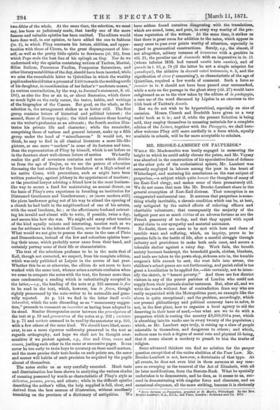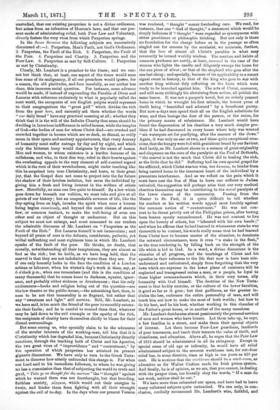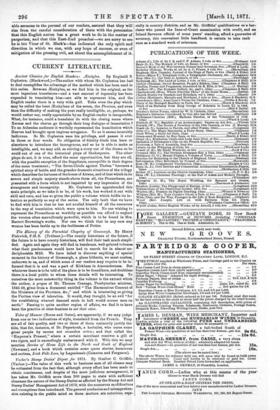MR. BROOKE-LAMBERT ON PAUPERISM.* WHILE Mr. Mackonochie was busily engaged
in measuring the height to which he could safely elevate the paten, and Mr. Voysey was absorbed in the construction of his speculative lines of defence at the other pole of the ecclesiastical sphere, Mr. Lambert was earnestly employed in labours among the poor in the heart of Whitechapel, and maturing his conclusions on the vast subject of
pauperism,—a subject which quite haunts the thoughts of many of the East-End clergy, and makes some of them prematurely old.
We do not mean that men like Mr. Brooke-Lambert share in the general conception of East-End distress. That conception is an exaggerated sentimental one. It assumes that pauperism is some- thing wholly inevitable, a chronic condition which can be, at best, only mitigated by the united efforts of relieving officers and charitable volunteers ; that consequently the majority of the indigent poor are as mach victims of an adverse fortune as are the French peasantry of to-day, and that they appeal with equal moral claim to our sympathy and material assistance.
No doubt, there are cases to be met with here and there of terrible want and suffering, which, on inquiry, prove to be genuine falls in the battle of life, after a manful struggle through industry and providence to make both ends meet, and secure tolerable shelter against a rainy day. Work fails, the benefit society becomes bankrupt, the household goods, clothes, blankets, and tools are taken to the pawn-shop, sickness sets in, the humble surgeon's bills cannot be met, the rent falls into arrear, the children's school-pence are not forthcoming, and parish relief is too great a humiliation to be applied for,—this certainly, not to inten- sify the sketch, is "honest poverty." And there are few district visitors in any of the poorer parishes of London who could not supply from their journals similar instances. But, after all, and we write the words without fear of contradiction from any who are really acquainted with the Metropolitan poor, an example like the above is quite exceptional ; and the problem, accordingly, which our present philanthropy and political economy have to solve, is not, in the first place, how to organize a local agency to aid the deserving in their hour of need,—but what are we to do with a pauperism which is costing the country £8,000,000 a year, which is absorbing into its ranks one in every twenty of the population ; which, as Mr. Lambert says truly, is raising up a class of people miserable in themselves, and dangerous to others ; and which, reduces man to such a degree of moral ruin and physical ill-being, that it seems almost a mockery to preach to him the truths of religion.
Some advanced thinkers can find no solution for the pauper question except that of the entire abolition of the Poor Law. Mr.
Brooke-Lambert is not, however, a doctrinaire of that type. At all events, he does not even hint in these sermons at any mea- sure so sweeping as the removal of the Act of Elizabeth, with all
its later modifications, from the Statute-Book. What he specially undertakes is to demonstrate, and he does, as it seems to us, suc- ceed in demonstrating with singular force and clearness, and an occasional eloquence, all the more striking, because it is obviously * Seren Sermons on Pauperism, preached at SI. Mark's, Whitechapel. By the Rer- Brooke-Lambe' t, M.A., B.C.L., late Vicar, London : Sotheran and Co. 187L
unstudied, that our existing pauperism is not a divine ordinance, but arises from an infraction of Heaven's laws, and that our pre- sent mode of administering relief, both Poor Law and Voluntary, directly fosters the very vices from which Pauperism springs.
In the Seven Sermons the following subjects are successively discoursed of :-1. Pauperism, Man's Fault, not God's Ordinance. 2. Pauperism, the Fault of the Rich. 3. Pauperism, the Fault of the Poor. 4. Pauperism and Charity. 5. Pauperism and the Poor Law. 6. Pauperism as met by Self-Culture. 7. Pauperism as met by Christianity.
Clearly, Mr. Lambert is a preacher to the times ; and we can- not but think that, at least, one aspect of the times would soon lose some of its malignancy, if all our preachers would ignore, for a season, the old platitudes, and face manfully, as our author has done, this immense social question. For instance, some advance would be made, if instead of expounding the Parable of Dives and Lazarus with reference exclusively to what is popularly called the next world, the occupants of our English pulpits would represent to their congregations the "great gulf" which divides the rich from the poor here, and earnestly ask them whether the words
our daily bread" have any practical meaning at all ; whether they think that it is the will of the Infinite Charity that some should be dwelling in luxurious indifference in celled houses, while the temples of God—the bodies of men for whom Christ died—are crushed and crowded together in houses which are so dark, so dismal, so evilly mean in their space and sanitary appointments, that every decency of humanity must suffer outrage by day and by night, and which only the bitterest irony would designate by the name of homes. Men and women, to whom existence is a burden because of its selfishness, and who, in their dim way, rebel in their hearts against the everlasting appeals to the very element of self-centred regard which is the root of their wretchedness, might under teaching like this be surprised into true Christianity, and learn, to their great joy, that the Gospel does not come to project into the far future the shadow of their loveless isolation, but eaves the individual by giving him a fresh and living interest in the welfare of others now. Mercifully, no man can live quite to himself. By a law which goes down far beneath our volition, we must take and give at all points of our history ; but an unspeakable newness of life, like the day-spring from on high, invades the spirit when once a human being begins consciously, and beyond the mere claims of statute law, or common instinct, to make the well-being of even one other soul an object of thought or endeavour. But on this subject we must not enlarge, and must commend to our readers the admirable discourse of Mr. Lambert on "Pauperism as the Fault of the Rich." But Lazarus himself is not immaculate ; and beyond all praise of ours is the delicate, considerate, pathetic, yet withal unflinching and most righteous tone in which Mr. Lambert speaks of the fault of the poor. He thinks, no doubt, that morally, notwithstanding all their temptations, they are almost as bad as the rich ; but he holds, as we have long held, that the marvel is that they are not indefinitely Worse than they are. For if one only honestly looks in the face the condition of a London artisan or labourer, when his winter's day's work is done, say, at 6 o'clock p.m., when one remembers (and this is the condition of many thousands) that he comes home to darkness, squalor, ignor- ance, and probably either sickness or drunkenness ; that his only excitements—books and religion being out of the question—are the low theatre or the public-house,—the astonishing fact, then, is seen to be not that immorality is so flagrant, but rather that any "sweetness and light" still survive. Still, Mr. Lambert, as we have said, is too much the friend of the poor to smoothly extenu- ate their faults ; and he is careful to remind them that, whatever may be laid down to the evil example or the apathy of the rich, the recipients of charity have themselves chiefly to blame for their dismal surroundings.
But some among us, who specially claim to be the advocates of the secular interests of the working-man, tell him that it is Christianity which has degraded him, because Christianity directly sanctions, through the teaching both of Christ and his Apostles, the two great vices of " improvidence " and "contentment," by the operation of which pauperism has attained its present gigantic dimensions. We have only to turn to the Greek Testa- ment to discover how utterly unfounded this charge is. For when our Lord said to his immediate followers, to whom he was giving no less a commission than that of subjecting the world to truth and good, "Take ye no thought for the morrow" the " thought " against which he warned them was not forethought, but that brooding, faithless anxiety, pips,ara, which would cut their energies in twain, and hinder them from fighting with all their strength against the evil of to-day. In the days when our present Version was rendered, " thought " meant foreboding care. We read, for instance, that one "died of thought," a statement which would be simply ludicrous if " thought " were regarded as synonymous with either providence or philosophic thinking. But not only is there no foundation for the charge before us in the passage so often singled out for censure by the secularist, we maintain, further, that the base of almost all Christ's parables is what may reverently be termed worldly wisdom. The maxims and habits of common prudence are surely, at least, assumed in the case of the woman who lights the candle and diligently sweeps the house for the one piece of silver ; or that of the shepherd who goes after the one lost sheep ; and specially, because of its applicability to a recent signal event in history, in that of the king who goes to war with another king without duly reflecting on the hosts which were ready to be launched against him. The acts of Christ, moreover, and still more strikingly his abstaining from action, all publish the same lesson. It was not a pauper's hovel, but an orderly peasant home in which he wrought his first miracle, the honed prose of thrift being "beautified and adorned" by a beneficent poetry. But now-a-days men spend their all on the English substitute for wine, and then besiege the door of the parson, or the union, for the primary means of subsistence. Mr. Lambert would have found the dispensation of his charities a very much simpler pro- blem if he had discovered in every house where help was wanted "six waterpota set for purifying, after the manner of the Jews." Again, it was only on one or two, and these quite exceptional occa- sions, that the hungry were fed with gratuitous bread by our Saviour. And lastly, as Mr. Lambert shows in a sermon of great originality and eloquence on the cure of the paralytic at the Pool of Bethesda, "the marvel is not the much that Christ did in healing the sick, as the little that he did." Suffering had its own special gospel for the afflicted, which Christ was too wise, too humane, to hinder from being carried home to the innermost heart of the individual by a premature interference. And as we reflect on the pain which it must have cost the Son of Man to leave one sufferer in Jana unhealed, the suggestion will perhaps arise that our very medical charities themselves may be contributing to the moral paralysis of the lower classes of the community. Passing from the Master to St. Paul, it is quite difficult to tell whether his conduct or his written words appeal most forcibly against the common notion of "contentment." He was not con- tent to be thrust privily out of the Philippian prison, after having been beaten openly uncondemned. He was not content to live upon the bounty of others, but "laboured with his own hands ;" and when he affirms that he had learned in whatsoever state he was therewith to be content, his words really mean that he had learned from Christ how to become master of the situation, to dominate the outward circumstance, were it even "a stake in the flesh," as the true rendering is, by falling back on the strength of the life which is hid in God. In a word, a divine discontent is the stimulus of all progress, and the• teachings of Christ and his apostles in their referenee to the life that now is have been mis- understood and caricatured, simply from forgetting that the very laws which are supreme in the lower plane of existence will be neglected and transgressed unless a man, or a people, be loyal to those higher commandments which, in their very terms, ally humanity with God himself. The doctrine of the New Testa- ment is that bodily exercise, or the culture of the lower faculties, is good so far as it goes ; but that godliness, as the greater in- cludes the less, embraces the entire personality of man, and will teach him not how to make the most of both worlds; but how to do his beat, and be his best, whether working in this chamber of the Father's great house, or in another of the many mansions.
Mr. Lambert desiderates almost passionately the personal services of men and women who have leisure. Let them take up, he says, a few families in a street, and make them their special objects of interest. Let them become Poor-Law guardians, landlords of poor tenements, and teach their tenants the value of thrift, and cleanliness, and education. Above all, he urges that the Poor Law of 1834 should be administered in all its stringency. Except in special cases of old age or infirmity, he would have all relief administered subject to the severest workhouse test, for out-door relief has, in some districts, risen as high in ten years as 420 per cent. He is anxious' that the workhouse should be a work-room, as educative as Sir Walter Crofton made his Irish prison system. And finally, he is of opinion, as we are, that you cannot, in dealing with the pauper class, too literally obey the words, "If a man do not work, neither shall he eat."
We have more than exhausted our space, and have had to leave many collateral subjects quite untouched. We can only, in con- clusion, cordially recommend Mr. Lambert's wise, faithful, and able sermons to the perusal of our readers, assured that they will rise from the careful consideration of them with the persuasion that this English nation has a great work to do in the matter of pauperism, and that this East-End preacher—we are sorry to see he is late Vicar of St. Mark's—has indicated the only spirit and direction in which we can, with any hope of success, or even of mitigation of the pressing evil, set about the accomplishment of it.




































 Previous page
Previous page